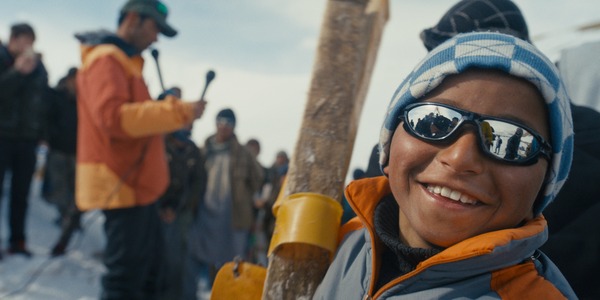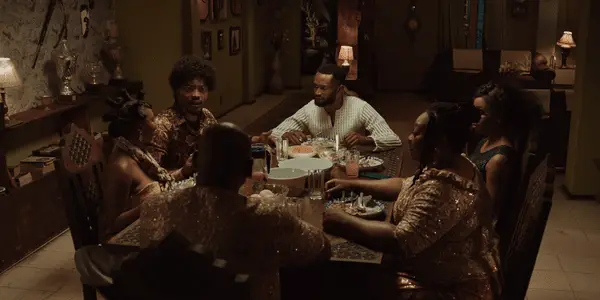Tribeca Film Festival 2024: CHAMPIONS OF THE GOLDEN VALLEY, BAM BAM: THE SISTER NANCY STORY & THE WEEKEND

Soham Gadre is a writer/filmmaker in the Washington D.C. area.…
The Tribeca Film Festival annually attracts many in the film community to the Tribeca district of New York City for a celebration of cinema as an escape from tragedy. Started by Robert De Niro in hopes of creating a creative space for many to find solace after the tragic 9/11 attacks, this film festival feels more like a community event that just so happens to feature movies in it. One of the recent unfortunate circumstances of this festival is the use of AI-generated movies as a major part of the outlet. If the initial idea of Tribeca was to foster human connection, through human ideas, and human beliefs, it not only seems antithetical to the cause, but downright inhumane to place AI-generated “art” as equal playing field to that. I didn’t enjoy all of the movies I watched at Tribeca this year, but at least the ones I did watch were made by people and if they had flaws, those flaws were the flaws of people as well – and that’s much more dignified than movies made by a computer.
Champions of the Golden Valley (Ben Sturgulewski)

I don’t really know what to make of Champions of the Golden Valley other than it comes across as a half-baked documentary. Focused on Alishah Farhang, a former resident of Bamyan, Afghanistan who began a love for skiing at the resorts there and aimed along with this friend Sajjid Husseini to qualify for the 2018 Winter Olympics, making them potentially the first Afghan skiers in Olympic history. Of course, being a story set in Afghanistan in the 2010s means the obstacles and dangers are clear from the get-go. The documentary doesn’t play coy about this, it begins in black-and-white with foggy and gloomy cinematography, with Alishah as a refugee in Europe. The sequences in Afghanistan, taken in flashback are sunny, and the village of Bamyan is captured fully in its gorgeous landscapes and intimate rustic village setting.
The documentary’s intentions, like many of these kinds of docs about inspirational stories of starry-eyed strivers from developing countries who’s dreams get dashed by war, are most likely good. But if we are to believe that the crux of this documentary’s emotional core rests on the ability to overcome great odds and bounce back from hellish circumstances, then shouldn’t those circumstances be relayed with clarity and objectivity? For all the shiny camerawork and nicely rendered imagery of Bamyan’s beautiful scenery and the jarring juxtaposition of harrowing footage of the Taliban’s and Al-Qaeda’s war with the United States, this documentary tends to treat these nationally catastrophic events as happenstance. Oh, it just so happened that the Taliban were terrorizing the communities in Bamyan. It just so happens that something occurred in 2019 that gave Taliban the power back. The United States decades-long role in Afghanistan and its sudden rug-pull after 20 years of non-stop invasion and exploitation of resources, to sign a document to give full power of the country back to the Taliban is glossed over in seconds.
Rather, the documentary tends to treat its Afghan hero as one who was betrayed by his own country, not the country invading his homeland. Alishah’s story is a riveting one. His involvement in developing the Afghan Ski Challenge, where local Afghan skiers can face off against many of the tourists who come to their mountains, is a great accomplishment in the midst of a country that had none of the infrastructure initially to host such a thing. But in that same vein, should his circumstance, his dream of continuing his journey in Bamyan to become a professional skier, not be contextualized by the actual events that took place that forced him to become a refugee in the West? It feels like there was great precaution to not step on any toes with this. One wouldn’t want to suggest, especially at Tribeca, the United States bombing of hospitals and innocent villages in Afghanistan and the CIA’s exploitation of its resources had played any part in ruining Alishah’s dreams there, now would they?
Bam Bam: The Sister Nancy Story (Alison Duke)

Now here’s a documentary that, for all of its VH1-esque “Behind the Music” style production, comes across with an energy and a real veneration for its subject. Sister Nancy, often referred to in her acts as “The Original” Sister Nancy, is seen performing at various venues her signature song – BAM BAM – which has become a sort of pioneering anthem for the influence of Dancehall on music and culture. The documentary mentions that it is one of if not the most sampled track of all time. The documentary takes a jarring shift from the energy of these concert venues to a suburban locale in New Jersey, where Sister Nancy stays.
The documentary jumps around a lot through different time periods in the artists life, speaking about the Dancehall culture in Jamaica, the difficult path for a women to make it into the scene, and the political and social upheavals happening during the rise of her career. It’s standard stuff, but the creative vibrance of the documentary’s presentation, mixing in various graphical representations of media, from old photographs and film footage with digital media makes it move and groove with ease. Filmmaker Alison Duke brings a collection of artists to speak on Sister Nancy’s legacy including radio DJs like DJ Cool Herc, DJ Alert, Angela Yee from The Breakfast Club, managers like Herbie Miller, producers like Young Guru, and artists like Janele Monae many of whom sample her work and incorporate it into their own. One aspect of the documentary I quite enjoyed was that it took the time to delve beyond Sister Nancy’s signature song and discuss the ways in which a legacy can be reduced and minimized through the proliferation of only track that becomes popular. It’s a blessing and a curse, especially for artists who feel they have much more to offer and have made other music just as good.
In several concert sequences we see the clear elevation in the crowds enthusiasm when Bam Bam plays versus other tracks. Duke also recounts the unfortunate circumstances in Jamaica where producers would unilaterally own the tracks that artists created, leaving artists like Sister Nancy without royalties despite the gargantuan footprint their art left on the world. It’s a documentary as inspirational as it is melancholy, a tale of tribute and influence and one of the tragic pitfalls of the music industry.
The Weekend (Daniel Oriahi)

Filmed with a glassy and cold exterior, The Weekend tries to set the mood of a brooding thriller early. From the get-go, it’s a movie that feels distant and closed off. This works because the movie is trying to hide a massive reveal that comes near the midway mark. There is a sense of off kilter energy in the way the characters talk to each other initially and that was something I assumed intentional, but as the film went along, it kept happening. The Weekend is a movie with a good idea at its center and competent execution, but it lacks any sort of emotional heft at its core. It feels like something rehearsed to the point of having the energy drained out of it.
Centered on a couple, Luke (Bucci Franklin) and Nikya (Uzuoamaka Aniunoh), who are in a rocky part of their relationship mainly because Luke refuses to let Nikya meet his family, Daniel Emeke Orahi’s pulpy Nigerian thriller fashions itself with a beginning very similar to Jordan Peele’s Get Out. But this movie isn’t about white and Black dichotomy, it’s rooted as a story about Nigerian diaspora and the culture of the homeland. It’s bit outlandish in the way it reveals itself and its scenes feel labored in the way they unfold. The dialogue itself feels contrived, leading us to its destination rather obviously in the way the characters not only spell out what they feel, but spell out exactly what is happening and going to happen next.
The performances don’t quite convince outside of Keppy Ekpenyong who excused a rugged charisma in his character that keeps his scenes grounded and unpredictable. As the film barrels towards its conclusion, it loses its grasp on the rope, with an ambitious set of twists that come across as increasingly loopy and harebrained. For genre junkies, this may be the exact amount of ridiculousness that can entice in a comedic way, but overall, I felt like the movie’s insistence on being a brooding dark and gritty thriller undercuts any sort of lightweight self-reference that it could have developed.
Does content like this matter to you?
Become a Member and support film journalism. Unlock access to all of Film Inquiry`s great articles. Join a community of like-minded readers who are passionate about cinema - get access to our private members Network, give back to independent filmmakers, and more.
Soham Gadre is a writer/filmmaker in the Washington D.C. area. He has written for Hyperallergic, MUBI Notebook, Popula, Vague Visages, and Bustle among others. He also works full-time for an environmental non-profit and is a screener for the Environmental Film Festival. Outside of film, he is a Chicago Bulls fan and frequenter of gastropubs.













